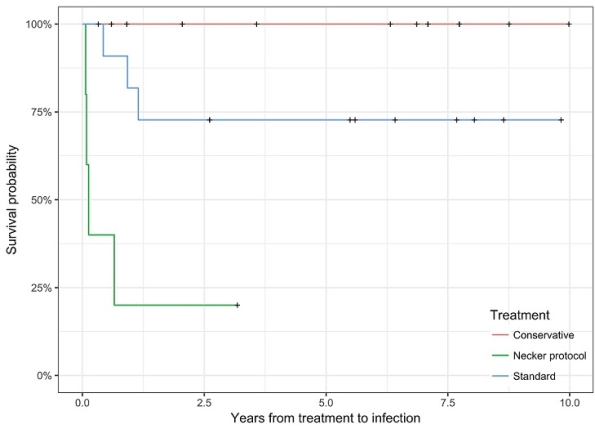Treatment Outcomes of Recurrent Primary Focal Segmental Glomerulosclerosis (FSGS) after Kidney Transplantation
1Department of Nephrology and Transplantation, Guy's and St. Thomas&apos
NHS Foundation Trust, London, United Kingdom
2Department of Renal Medicine, Hospital Dr. Fernando Fonseca, Lisbon, Portugal
3Department of Health Sciences, University of Leicester, Leicester, United Kingdom.
Meeting: 2018 American Transplant Congress
Abstract number: 107
Keywords: Glomerulonephritis, Graft survival, Kidney transplantation, Recurrence
Session Information
Session Name: Concurrent Session: Kidney Complications: Disease Recurrence
Session Type: Concurrent Session
Date: Sunday, June 3, 2018
Session Time: 4:30pm-6:00pm
 Presentation Time: 5:18pm-5:30pm
Presentation Time: 5:18pm-5:30pm
Location: Room Hall 4B
Introduction: Primary FSGS can recur in the renal allograft and is associated with poor graft outcomes. There is no established therapeutic intervention to prevent or treat recurrent primary FSGS. We studied the outcomes and the complications of the different treatments used in our renal department for recurrent FSGS post-transplantation.
Methods: We retrospectively collected data on renal transplant recipients transplanted in our hospital from 2005 to 2016 who were diagnosed with primary FSGS and transplant biopsy proven recurrent primary FSGS. We compared the graft and patient survival along with complications of the different treatment options.
Results: 27 patients were diagnosed with recurrent FSGS. 10 (37%) received conservative treatment (steroids ± RAS blockade), 12 (44%) received standard treatment (steroids ± RAS blockade ± Plasma exchange (PEX)) and 5 (19%) received the Necker Protocol (steroids, PEX and intravenous ciclosporin). After 1-year of follow up, there was no difference regarding the graft survival among the groups. There were two deaths in the Necker group and one death in the other groups. However, this did not reach statistical significance and the patient survival was comparable among treatments. Compared with the other treatments, patients treated with the Necker protocol were at a higher risk of infection (p< 0.01).
Discussion: Renal transplant patients diagnosed with recurrent FSGS and treated with the Necker protocol were at a higher risk for infection compared to other therapeutic options. There was no difference in terms of allograft survival and patient survival among the treatment groups.
CITATION INFORMATION: Aguiar R., Pereira F., Gasparini A., Chowdhury P., Game D., Moutzouris D. Treatment Outcomes of Recurrent Primary Focal Segmental Glomerulosclerosis (FSGS) after Kidney Transplantation Am J Transplant. 2017;17 (suppl 3).
To cite this abstract in AMA style:
Aguiar R, Pereira F, Gasparini A, Chowdhury P, Game D, Moutzouris D. Treatment Outcomes of Recurrent Primary Focal Segmental Glomerulosclerosis (FSGS) after Kidney Transplantation [abstract]. https://atcmeetingabstracts.com/abstract/treatment-outcomes-of-recurrent-primary-focal-segmental-glomerulosclerosis-fsgs-after-kidney-transplantation/. Accessed February 20, 2026.« Back to 2018 American Transplant Congress

